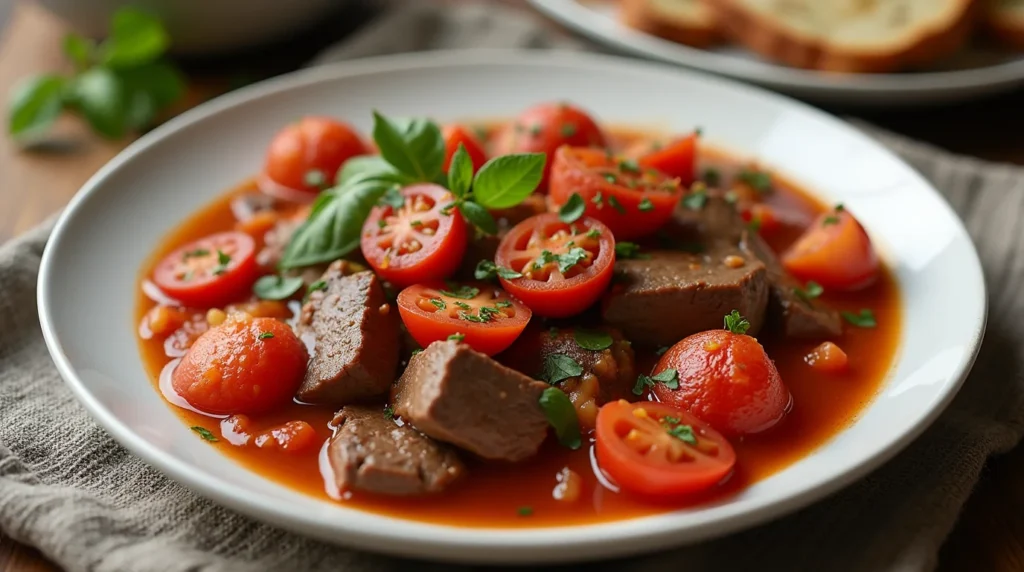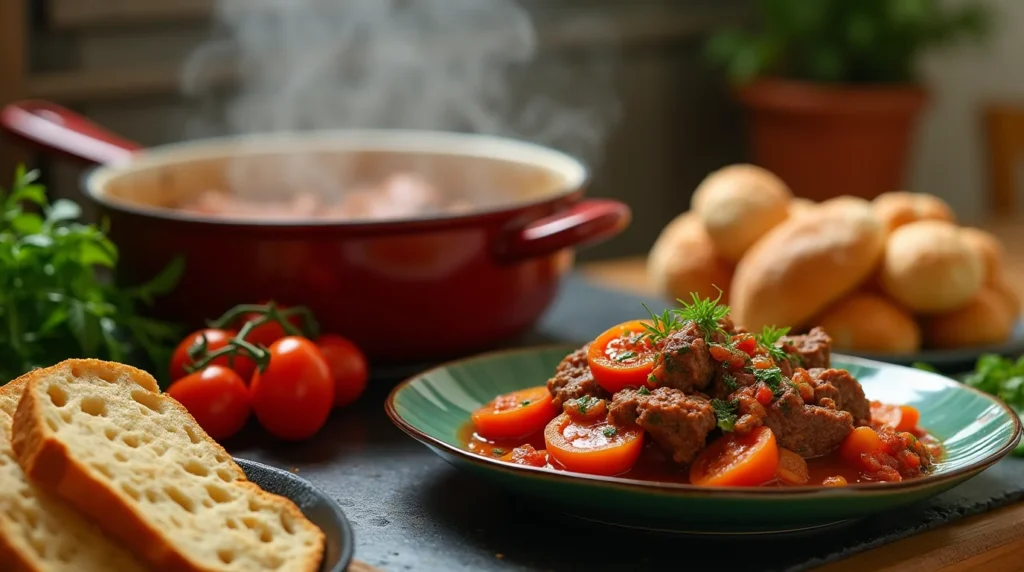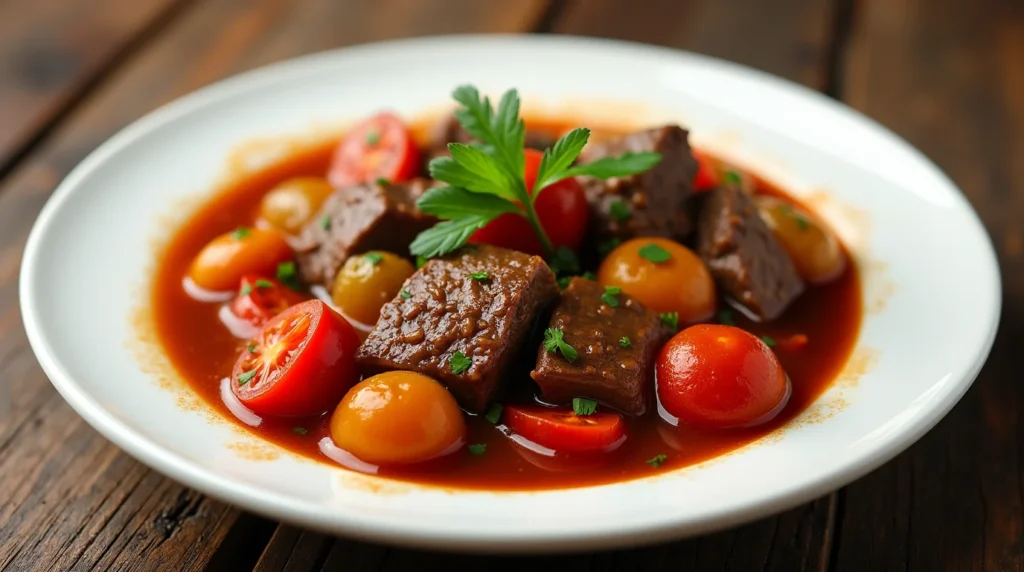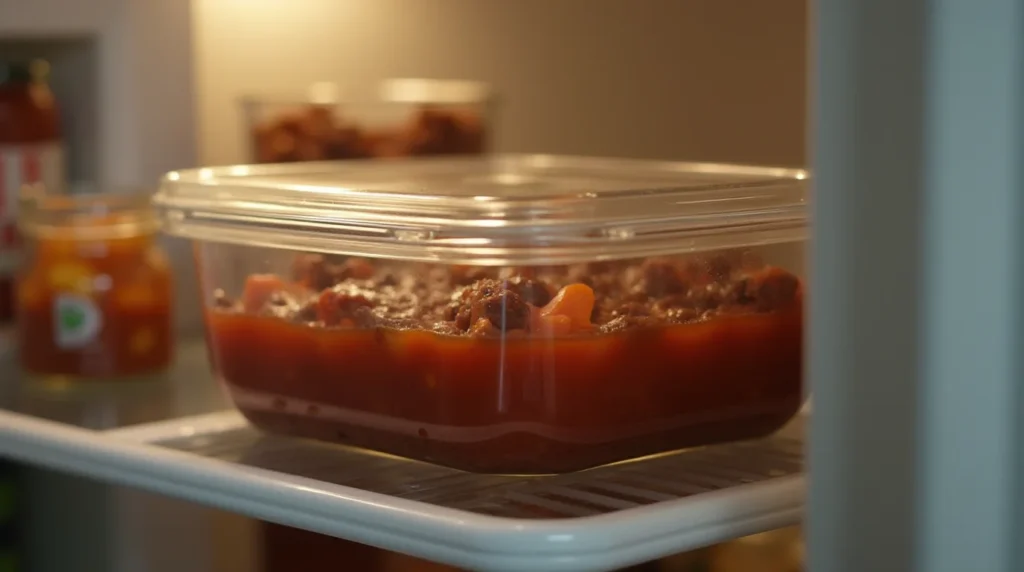
How to Make Perfect Tomato Beef Stew for a Delicious Family Dinner
Share this recipe
This hearty stew is more than a meal; it’s a family dinner celebration. It’s perfect for when you want comfort food or to impress your family with a classic dish. This tomato beef stew recipe will soon be your favorite.
As the wind stirs outside and warmth beckons from the kitchen, making tomato beef stew feels magical. I remember watching my grandmother simmer her legendary recipe—it filled our home with the most comforting aromas.
Join me on a culinary journey. We’ll turn simple ingredients into an unforgettable dining experience.
Key Takeaways
- Master the art of creating a rich, flavorful tomato beef stew
- Learn professional techniques for tender meat preparation
- Discover the secrets to developing deep, complex flavors
- Understand the importance of ingredient selection
- Create a comforting meal that brings families together
Understanding the Essential Ingredients for a Rich Tomato Beef Stew
Starting with the right ingredients is key to making great meat and vegetable stews. Your tomato beef stew’s success depends on choosing ingredients that add depth of flavor. This ensures the stew is tender and delicious.
Making amazing beef recipes means paying attention to every detail. Knowing how each ingredient affects the taste is crucial.
Selecting the Best Cut of Beef
For hearty stews, pick beef cuts that get tender with slow cooking. Good options include:
- Chuck roast – rich flavor and excellent marbling
- Beef shoulder – consistently tender texture
- Short ribs – intense flavor profile
Choosing Fresh Vegetables and Tomatoes
Fresh veggies make your stew stand out. Focus on:
- Ripe, firm tomatoes with deep color
- Seasonal veggies for the best flavor
- Organic produce when you can
“The secret to an incredible stew lies in using the freshest, highest-quality ingredients.” – Professional Chef
Key Aromatics and Seasonings
The right mix of aromatics and seasonings makes your beef recipes pop. Don’t forget:
- Garlic
- Onions
- Fresh herbs like thyme and rosemary
- High-quality sea salt
- Cracked black pepper
By picking each ingredient with care, you’ll make a tomato beef stew full of rich flavors. It will impress your whole family.
Equipment and Kitchen Tools You'll Need
To make the perfect tomato beef stew, you need the right tools. Whether you’re making traditional one-pot meals or slow cooker dishes, the right equipment is key. It makes cooking easier and more enjoyable.
- Large Cooking Vessel: A heavy-bottomed Dutch oven or a quality slow cooker for even heat distribution
- Sharp chef’s knife for precise ingredient preparation
- Cutting board with a non-slip surface
- Measuring cups and spoons for accurate ingredient portions
- Wooden spoon or sturdy spatula for stirring
“The right tools transform cooking from a chore to a culinary adventure.” – Professional Chef
Choosing the right cooking tool is important. Slow cooker beef stew dishes are great for home cooks. A 6-quart slow cooker is perfect for family-sized meals. It keeps the temperature steady and cooking time short.
Here are more tools you might find useful:
- Meat thermometer for checking beef doneness
- Ladle for serving
- Large storage containers for leftovers
Quality kitchen equipment makes your tomato beef stew delicious and easy to prepare. It’s worth the investment.
Preparing Your Ingredients for the Perfect Stew
Starting with the right ingredients is key to making tasty beef recipes. Your tomato beef stew will be a hit if you prep each part carefully. This stew is perfect for busy weeknights, needing some planning and skill.
Meat Preparation Techniques
Choosing the right beef cut is essential for a tender, flavorful stew. Here’s how to get your meat ready:
- Choose chuck roast or beef shoulder for maximum tenderness
- Trim excess fat, leaving some for rich flavor
- Cut meat into uniform 1-inch cubes
- Pat meat dry with paper towels before seasoning
Vegetable Cutting Guide
Fresh veggies make your stew stand out. Cutting them right ensures even cooking and looks great:
- Wash all vegetables thoroughly
- Use sharp knife for precise cuts
- Cut potatoes and carrots into 1-inch chunks
- Dice onions uniformly for consistent flavor
Measuring and Organizing Seasonings
Get ahead by prepping your seasonings early. Mise en place makes your meals better.
“Preparation is the key to stress-free cooking” – Professional Chef Wisdom
- Measure herbs and spices before starting
- Use small bowls to organize ingredients
- Check expiration dates on dried seasonings
Step-by-Step Guide to Making Tomato Beef Stew
Making tomato beef stew is like creating a masterpiece. It turns simple ingredients into a hearty stew that’s incredibly satisfying. This dish needs patience and skill to get those deep, rich flavors right.

- Meat Preparation: Begin by drying your beef chunks with paper towels. This step is key for browning and getting a tasty crust.
- Browning the Meat: Heat a big pot and add oil. Brown the meat in batches to avoid overcrowding. This step makes the meat’s outside rich and flavorful.
- Aromatics and Deglazing: Cook onions, garlic, and carrots in the same pot. Use red wine or beef stock to deglaze, getting all the tasty bits from the bottom.
- Liquid and Seasoning: Add tomatoes, beef broth, herbs, and spices. Mix everything well to blend the flavors.
“The key to an exceptional tomato beef stew lies in giving it plenty of time for the flavors to meld and the meat to reach perfect tenderness.” – Professional Chef
Cooking the stew slowly makes the beef tender and blends all the flavors. Low and slow is the secret to turning simple ingredients into a memorable dish.
- Cook on low heat for 2-3 hours
- Stir occasionally to prevent sticking
- Check meat tenderness periodically
Your tomato beef stew is done when the meat is tender and the sauce is thick and glossy. Serve it hot and enjoy your hard work!
Mastering the Art of Slow Cooking Your Stew
Slow cooker dishes are the ultimate winter warmers. They turn simple ingredients into amazing comfort food. Making the perfect tomato beef stew needs patience and skill.
Learning the details of slow cooking can make your stew truly stand out. The right steps ensure tender meat and deep flavors. Your family will look forward to dinner even more.
Temperature Control Tips
Keeping the heat low is key for slow cooker dishes. Here’s what to do:
- Keep your slow cooker between 170-200°F
- Avoid lifting the lid too frequently
- Use the low setting for maximum tenderness
Timing Guidelines for Tender Meat
Getting the meat tender is all about timing. Tough cuts become tender when cooked slowly.
- Start with 4-6 hours for most beef cuts
- Check meat tenderness after 4 hours
- Allow up to 8 hours for larger, tougher cuts
Adding Vegetables at the Right Moment
“Timing is everything when adding vegetables to your winter warmers.” – Professional Chef
Adding vegetables at the right time prevents them from getting mushy. Harder vegetables like carrots can cook longer. Add delicate ingredients in the last hour.
Your patience will pay off with a delicious, hearty stew. It’s a true comfort food classic.
Secrets to Achieving the Perfect Stew Consistency

Making hearty stews is all about texture and thickness. Your beef recipes will stand out when you know how to adjust the stew’s consistency. It’s crucial to pay attention to liquid ratios and thickening methods for meat and vegetable stews.
First, grasp the basics of stew thickness. Aim for a smooth, velvety texture that sticks to your spoon. It should not be too thin or too thick. Chefs use various techniques to hit this sweet spot.
- Flour or cornstarch coating for meat before browning
- Using a roux as a thickening base
- Adding potato or root vegetables for natural thickening
- Reducing liquid through slow cooking
“The secret to a perfect stew is patience and understanding how ingredients interact.” – Professional Chef Recommendation
When making beef recipes, keep these thickening tips in mind. Coating your meat pieces in seasoned flour before browning adds a natural thickener. A tablespoon of tomato paste can also enhance the flavor and help thicken your stews.
For stews with meat and vegetables, slow cooking is key. It allows ingredients to break down and thicken naturally. Your stew should be saucy but not too watery.
- Stir occasionally to prevent sticking
- Use low, consistent heat
- Allow enough cooking time for ingredients to release natural thickeners
Try out these methods to find your ideal stew consistency. Each attempt will improve your skills in making top-notch hearty meals.
Tips for Enhanced Flavor Development
Making a memorable tomato beef stew is more than just mixing ingredients. It’s about layering flavors and choosing the right ingredients. This turns your dish into a true comfort food.
To make your winter warmers stand out, learn how ingredients work together. This knowledge is key to creating delicious dishes.
Layering Flavors Successfully
Building a rich tomato beef stew starts with:
- Searing meat to get deep, caramelized flavors
- Deglazing the pan with tasty liquids
- Adding complexity by introducing ingredients slowly
Wine and Stock Selection
The right liquid base can take your stew to the next level. Here’s what to keep in mind:
- Opt for dry red wines for strong beef flavors
- Go for low-sodium beef stock to control seasoning
- Match wine with the intensity of your meat
Herb and Spice Combinations
Choosing the right herbs and spices can make your stew unforgettable. Try:
- Fresh thyme and rosemary for earthy flavors
- Bay leaves for a subtle depth
- Smoked paprika for a complex warmth
“The key to a remarkable stew isn’t complexity but mastering the art of blending flavors in perfect harmony.”
Mastering these techniques will help you make a tomato beef stew that warms both body and soul.
Common Mistakes to Avoid When Making Tomato Beef Stew
Making tasty beef stews can be challenging. Even skilled cooks can make mistakes when making tomato beef stew. Knowing these common errors can help you make your meals better.
“Cooking is about precision, passion, and avoiding simple mistakes that can derail your entire dish.”
Let’s look at the main mistakes that can ruin your beef stew and how to avoid them:
- Choosing the Wrong Beef Cut: Pick tough, marbled cuts like chuck or bottom round. Lean meats get dry and lack flavor.
- Skipping the Meat Searing Step: Always brown your beef before slow cooking. This step adds flavor and creates a nice crust.
- Overcrowding the Pot: Give your ingredients room. Too many ingredients can make the stew steam instead of brown.
- Inconsistent Vegetable Cutting: Cut vegetables the same size for even cooking and texture.
For the best stews, be patient. Hasty cooking can ruin the taste and texture. Slow cooking turns simple ingredients into unforgettable meals.
Temperature control is crucial. Cooking low and slow makes beef stews tender and delicious. This will impress your family and make dinner exciting.
Serving Suggestions and Accompaniments
Turn your tomato beef stew into a memorable family dinner with the right sides. These sides can make your comfort food stand out. They add to the joy of a warm meal during winter.
Here are some tasty pairings to highlight your stew:
- Crusty artisan Sourdough bread for soaking up rich sauce
- Creamy mashed potatoes
- Buttered egg noodles
- Fluffy white rice
- Roasted seasonal vegetables
“A great stew is always better with the right companions on the plate!” – Home Cooking Wisdom
For a full family dinner, add fresh sides to your stew. A crisp green salad or roasted vegetables offer a nice contrast. They help balance the rich flavors of the stew.
Wine lovers might enjoy a Cabernet Sauvignon or Merlot with their stew. These wines match the beef’s deep flavors, making the meal even better.
Pro tip: Serve your stew in warmed bowls to keep it at the perfect temperature all meal long.
Storage and Reheating Guidelines
Keeping your homemade tomato beef stew fresh is key. It’s great for weeknights and family dinners. But, you must store and reheat it right to keep the taste and safety.

Proper Cooling Methods
After you’ve eaten, cool the stew fast to stop bacteria. Here’s how:
- Let the stew cool to room temperature in 2 hours
- Put it in shallow containers to cool faster
- Don’t let it sit at room temperature too long
Freezing Instructions
Freezing is a great way to save your stew for later. Follow these tips:
- Use containers that are airtight and safe for the freezer
- Leave 1 inch of space at the top for it to expand
- Write the date and what’s inside on the container
- Freeze it for up to 3 months
Reheating Best Practices
Here’s how to reheat your stew the right way:
- Thaw it in the fridge overnight
- Reheat it slowly on the stovetop or in the oven
- Stir it often to avoid burning
- Make sure it heats up to 165°F inside
“A well-reheated stew can be just as delicious as when it was freshly cooked!” – Home Cooking Experts
Pro tip: Add a bit of broth when reheating to keep it moist and prevent dryness.
Conclusion
Making the perfect tomato beef stew is more than just a recipe. It’s about adding warmth and comfort to family dinners. This classic dish brings people together, turning simple ingredients into a memorable meal.
Your tomato beef stew journey doesn’t stop with a recipe. Each time, you’ll learn new techniques and experiment with flavors. This dish is versatile, perfect for any occasion, from weeknights to weekends.
Cooking is an art of passion and practice. Trust your instincts, adjust seasonings, and make it your own. With each stew, you’ll grow more confident and connect deeper to cooking, making it a family tradition.
As you keep improving your stew-making, you’ll see it’s more than a meal. It’s a way to make lasting memories and show love through delicious, homemade food.
Tomato Beef Stew recipe
Warm, hearty, and rich with flavor, this Tomato Beef Stew is the ultimate comfort food. With tender chunks of beef, vibrant vegetables, and a savory tomato base, this stew is perfect for cozy family dinners, especially during chilly evenings. Inspired by classic family traditions, it’s a meal that brings everyone to the table.
Recipe Details
- Serving Size: 6 servings
- Prep Time: 30 minutes
- Cook Time: 2 hours
- Total Time: 2 hours 30 minutes
Ingredients (Per Serving)
- 1/3 lb beef chuck, cubed
- 2/3 large tomato, diced
- 1/3 onion, chopped
- 1/2 carrot, sliced
- 1/3 celery stalk, chopped
- 2/3 garlic clove, minced
- 1/3 cup beef broth
- 2 tsp tomato paste
- Fresh thyme and rosemary (to taste)
- Salt and pepper (to taste)
Nutritional Facts (Per Serving)
- Calories: 385
- Protein: 36g
- Carbohydrates: 15g
- Fat: 22g
- Fiber: 3g
- Sodium: 520mg
- Sugar: 6g
Instructions
- Prepare the Ingredients: Pat the beef cubes dry with paper towels. Wash and chop all vegetables. Measure out seasonings and tomato paste.
- Sear the Beef: In a large Dutch oven or pot, heat a bit of oil over medium-high heat. Brown the beef cubes in batches, searing all sides. Remove and set aside.
- Sauté Aromatics: In the same pot, add onions, garlic, carrots, and celery. Sauté for 5 minutes until softened and fragrant.
- Deglaze the Pot: Add a splash of beef broth to deglaze, scraping up the browned bits from the bottom of the pan.
- Build the Stew: Stir in diced tomatoes, tomato paste, the remaining broth, and the seared beef. Add thyme, rosemary, salt, and pepper.
- Simmer: Bring to a boil, then reduce heat to low. Cover and simmer for 2 hours, stirring occasionally.
- Check for Doneness: After 2 hours, the beef should be fork-tender and the stew thick and rich. Adjust seasoning to taste.
- Serve: Ladle hot into bowls and serve with crusty bread, rice, or mashed potatoes.
Serving Tips
- Serve with warm artisan bread or fluffy mashed potatoes.
- Pair with a bold red wine like Cabernet Sauvignon or Merlot.
- Add a crisp green salad for a fresh contrast.
Storage & Reheating
- Storage: Let stew cool completely. Store in an airtight container in the fridge for up to 4 days or freeze for up to 3 months.
- Reheating: Thaw overnight in the fridge (if frozen). Reheat gently on the stovetop, stirring occasionally, until internal temperature reaches 165°F. Add broth as needed to restore consistency.
Final Thoughts
This Tomato Beef Stew isn’t just a recipe—it’s a warm memory in the making. With its deep flavor and tender texture, it’s bound to become a beloved staple at your family table. Enjoy every comforting spoonful!










